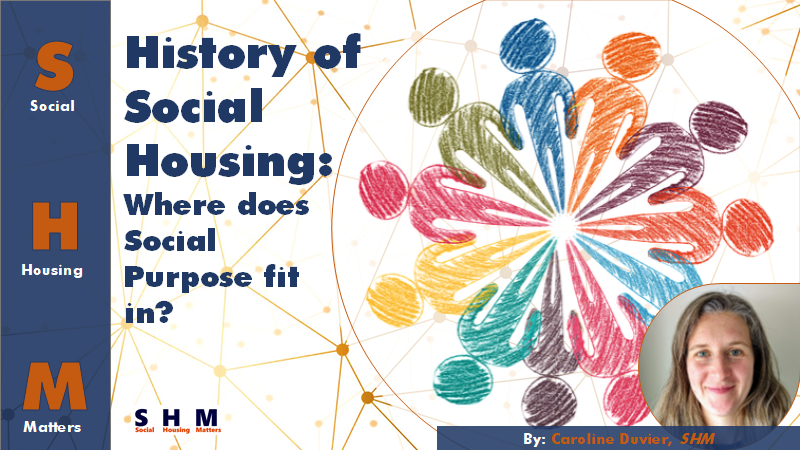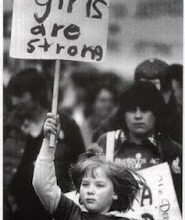
Please do not get me wrong. The title might suggest I disagree with social purpose, which I do not. I wholeheartedly believe that social housing providers should strongly be driven by their social purpose. However, when you dig a bit into the history of social housing in England, you find that social purpose had a recent resurgence, and one that seems rather put on and fake.
Social housing in England is quite new. The term ‘social housing’ itself only came into colloquial use with the shift from council housing to housing associations from the 1980s onwards. Social housing today encompasses all types of government-subsidised housing at below market rent, whether provision is by councils or by other types of providers.
History of Housing Associations
Before both World Wars, social housing did not exist. The market was made up of 90% private renters and 10% super rich homeowners. But this is where things get interesting from a social purpose perspective. Although there was no state-led housing provision for the poor (corporation housing was private), there were a few charities that strongly held a belief in their social purpose to help those in need. Peter Malpass, a prominent housing researcher, makes the argument that housing associations are wrongly viewed as a modern invention, created with the large scale voluntary transfer. However, those early charities operating in the 19th century were housing associations – with a strong social purpose. Their only goal was to provide housing for those in need. And by that I mean they really helped people, they had no subsidies, they were driven by their good will (I know there were exceptions, but mainly rich people trying to look good while posing next to a slum).
When you fast forward to the years after the second world war, you still have a small sector of housing associations, the same kinds of organisations that existed in the 19th century. The interesting point here is that they were not regulated by the State, all they did was provide housing for those in need, that was their sole purpose. Some were specialist providers, providing housing for people with special needs, or care homes, or homes for veterans. In essence then, social purpose in social housing existed for a very long time in a pure form (if you can call it that) with small housing associations, especially in those who provided specialist housing.
Council Housing
Often, we like to think of the heyday of social housing as the years just before Margaret Thatcher became Prime Minister. I know this is semantics for some, but really, the 1960s and 1970s were the period of council housing, not just social housing. The government was forced to provide public housing after both world wars. While it was private builders who had built almost all of housing prior to WWI, during the post-war years, it was primarily councils who built housing, and primarily subsidised housing (housing subsidies were introduced after WWI). Private builders did not stop or go bust, the country needed every single house that was built, and even more.
What is important during all the different periods of housing provision is the rhetoric. The rhetoric around poor people has remained unchanged for the past 200 years. Undeserving. Immoral. Corrupt minds. Criminals. The same words used to refer to the poor living in slums in the 19th century is used today to refer to poor people living in social housing. The difference? State-led versus private housing provision, that is all. Is there any truth to the claims made towards people without money? No. We covered this in many articles in SHM already, so I will not go into detail here, just to say that poverty is simply lack of money, not lack of character. In fact, many a psychologist studying the effects of money and power will tell you that it is the HAVING of money that leads to lack of character, NOT the ABSENCE of money.
The Decimation of Council Housing
Returning to social purpose. Margaret Thatcher decimated council housing with two policies: Right to Buy (the goal: getting rid of council housing), and large scale voluntary transfer (LSVT, the goal: privatising council housing), both happily adopted by every government that came after her, especially New Labour. As Thatcher herself said, her greatest achievement was that New Labour adopted neoliberalism wholeheartedly. Council housing after the wars was not built out of the goodness of the government’s heart – it was a response to shortage of housing and still existing slums that had not been effectively cleared. Council housing was built quickly, quantity was put before quality. What we are left with today is a large amount of housing that was built to last 20 years, still standing today, and social housing providers struggling to keep up with repairs and maintenance for these poorly built properties.
Right to Buy and LSVT let to council housing shrinking from over 30% in the late 1970s, to just over 6% today. Housing associations provide around 10% of social housing today. This is again where it gets interesting. Housing associations today are NOT the same as early housing associations with a clear social purpose. This is not to say they have no ambition to have a social purpose, rather, the way they have been created and told what to do left out the social purpose, probably on purpose. Since the 1980s in line with privatisation, housing associations have been told to become more managerial. Government tightly regulates the sector through the economic standards – with the Social Housing White Paper giving a nod to the neglected customer standards. Economic standards measure the financial viability and governance of HAs, while introductions like ratings create a name and shame environment where downgrading has serious financial consequences. At the same time, HAs are asked to be more managerial by adopting business practices from the private sector (questionable in terms of whether these actually work).
The Managerialisation of Housing Associations
Housing associations today are not the same as they were in the 19th century – even though some of the existing ones were part of the LSVT, a bunch of new ones were created (or the Council Housing department was given a new office and new name). Neither of these organisations had much managerial practice, as people tend to ‘work their way up’ in housing. It is entirely possible for a housing officer to become the CEO of a HA by working their way to higher and higher positions. Government puts pressure on HAs by asking them to concentrate on financial viability and ‘properly’ managing their organisations. Statistical data returns every quarter – few other sectors are this tightly regulated. You see this reflected in Board position advertisement, where you need to have managerial experience if you want to be a Board member of some HAs (not all do that). How can you create social purpose in an environment such as this?
I am not making excuses for HAs, but I can see how it is difficult for an organisation receiving this much pressure – without adequate funding – to ‘return’ to its social purpose. Further, no-one ever explains what exactly they mean by social purpose. The history of social housing is new, so what exactly are they referring to? An organisation cannot return to a purpose it never had.
I think a more apt way to go about the social purpose debate is to find a way how modern social housing providers, irrespective of how they were created, serve those who live in their properties. Social housing tenants will eventually be reduced to rent-paying consumer entities devout of any humanity. It feels like this is the goal of our current government, and most governments preceding it. Through various ways of decimation, social housing has shrunk to just about 16%, providing housing for those most in need, i.e. the poor. And we all know what we ought to think of poor people! George Osborne tells us people on housing benefit are ‘shirkers’, Ian Duncan-Smith prefers the term ‘feckless, work-shy household’. Both are despicable, both men should be ashamed of themselves. Let us show them just how wrong they are. Difficult times call for innovative ways to make good things happen – so please, social housing providers, despite all the hurdles you need to jump over, find a way to create housing anyone would be proud to call their home. And please, mean it, don’t just fake it.
Find Caroline on twitter:




